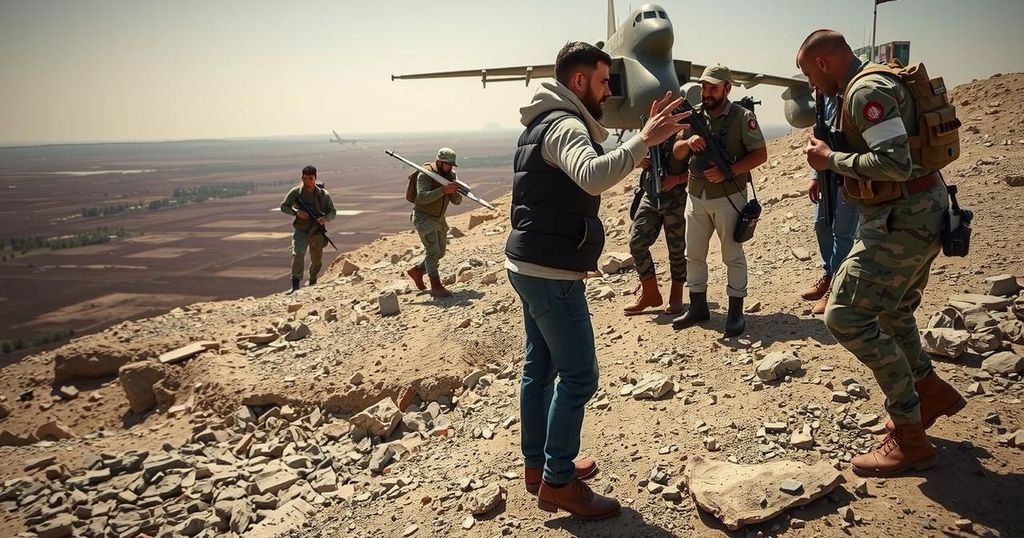Kurdish Expectations: Seeking Israeli Support Amidst Increasing Turkish Threats
Kurdish populations in Syria are calling for Israel to provide concrete support in the face of escalating threats from Turkey. The situation has been exacerbated by Turkey’s military actions against the Syrian Democratic Forces (SDF), which have previously been instrumental in defeating ISIS. The Kurdish community seeks actionable support from Israel and the international community to protect their territories and lives against ongoing assaults.
On December 18, Gideon Sa’ar, the Israeli Foreign Minister, articulated the international community’s responsibility to protect minorities in Syria, particularly amid the threats facing the Kurdish population. Many Kurds expressed the desire for tangible support from Israel beyond mere verbal affirmations of solidarity. The fear of potential Turkish aggression, reminiscent of past conflicts such as the 2018 invasion of Afrin, looms heavily in the minds of the Kurdish community, who have suffered extensive displacement and violence.
The current situation in eastern Syria is precarious, with the Kurdish management led by the Autonomous Administration of North and East Syria (AANES) and the Syrian Democratic Forces (SDF) holding significant territory. Formed with support from the United States, the SDF has emerged as a critical force against ISIS, but it is now the target of Turkish military hostility due to its ties to the Kurdistan Workers Party (PKK), which Turkey classifies as a terrorist organization. Despite the SDF’s crucial role in combating ISIS, their existence is under constant threat from Turkish-backed militias, which employ brutal tactics similar to those of extremist groups.
The Kurds are particularly concerned about their cities, such as Kobani, Qamishli, and Derik, facing assaults from Turkish forces and their allies, the Syrian National Army (SNA). The SNA’s bombardment has raised alarms about the safety of strategic locations like the Tishreen Dam, an essential resource in the region. It is crucial to note that the SDF’s actions have primarily been defensive, as they do not initiate attacks, yet they remain on the frontier of conflict.
Amidst these tensions, there is speculation about the potential for Israeli support, with Kurds questioning whether Israel will take concrete actions to aid them, especially as they face the prospect of more violent incursions. Discussions suggest there may already be limited cooperation between Israel and the SDF or the U.S.-led Coalition, but the Kurdish community remains cautious and uncertain about actionable support being offered. They appeal for aerial assistance, fearing not only Turkish threats but also influences from Qatar, which are reminiscent of prior support for Hamas.
The SDF’s achievements against ISIS contrast starkly with their current vulnerabilities, amplified by Turkey’s efforts to eliminate Kurdish presence in eastern Syria, alongside its desire to displace American military influence. The geopolitical landscape has shifted, with Turkey’s growing assertiveness following the perceived withdrawal of Russian and Iranian influence. As a result, the Kurdish populace in Kobani, which has symbolized resilience against ISIS, now faces the looming specter of renewed conflict territorial encroachment by Turkey.
The Kurdish population in Syria has been significantly impacted by geopolitical dynamics involving Turkey, Israel, and the United States, particularly regarding the fight against ISIS and the ongoing threats posed by Turkish military actions. The Kurdish forces, primarily represented by the Syrian Democratic Forces (SDF), have received support from the U.S. and have proven effective in combatting ISIS. Moreover, the tensions with Turkey complicate the situation further, as Turkey’s military operations target the SDF, whom it regards as affiliated with the PKK, a designated terrorist organization. The Kurdish community has endured violence and displacement, raising concerns about their future in a hostile regional environment.
In summary, the Kurdish community in Syria stands at a critical juncture, facing renewed threats from Turkey amid ongoing warfare and regional instability. Their hopes for substantial Israeli support reflect a broader quest for security and acknowledgment from the international community. The SDF’s tactical successes against ISIS highlight their importance in stabilizing the region, yet the persistent attacks from Turkish-backed forces threaten to undermine these efforts. Therefore, the Kurdish demand for a reliable ally capable of providing concrete assistance is both timely and essential to ensure their survival and autonomy in eastern Syria.
Original Source: www.jpost.com




Post Comment